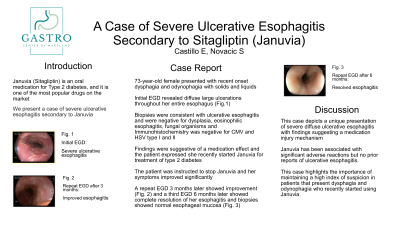Sunday Poster Session
Category: Esophagus
P0513 - A Case of Severe Ulcerative Esophagitis Secondary to Sitagliptin (Januvia)
Sunday, October 22, 2023
3:30 PM - 7:00 PM PT
Location: Exhibit Hall

Has Audio
- EC
Eduardo Castillo, MD
Gastro Center of Maryland
Columbia, Maryland
Presenting Author(s)
Sofia Novacic, BS, Eduardo Castillo, MD
Gastro Center of Maryland, Columbia, MD
Introduction: Januvia (Sitagliptin) is an oral medication for Type 2 diabetes, and it is one of the most popular drugs on the market. Severe ulcerative esophagitis usually occurs in hosts with impaired immunity resulting from chemotherapy, transplantation, or HIV infection and are commonly caused by infectious pathogens like Candida, cytomegalovirus (CMV), and herpes simplex virus (HSV). This condition can rarely be caused by medications. We present a case of severe ulcerative esophagitis secondary to Sitagliptin (Januvia).
Case Description/Methods: A 73-year-old female with a medical history of type 2 diabetes, hypertension and hypothyroidism presented to the Gastroenterology clinic complaining of recent onset dysphagia and odynophagia with solids and liquids. She had a previous history of leukemia which was in remission after treatment with chemotherapy several years before. She underwent an esophagogastroduodenoscopy (EGD) which revealed diffuse large ulcerations throughout her entire esophagus. Biopsies were consistent with ulcerative esophagitis and were negative for dysplasia, eosinophilic esophagitis, and fungal organisms. Immunohistochemistry (IHC) was negative for CMV and HSV type I and II. Findings were suggestive of a medication effect. Upon review of her medications, the patient expressed she recently started Januvia for treatment of type 2 diabetes.
The patient was instructed to stop Januvia and her symptoms improved significantly. A repeat EGD 3 months later showed improvement of the ulcerative esophagitis. A third EGD 6 months later showed complete resolution of her esophagitis and biopsies showed normal esophageal mucosa.
Discussion: This case depicts a unique presentation of severe diffuse ulcerative esophagitis with findings suggesting a medication injury mechanism. After withholding Januvia, the patient’s esophagitis completely resolved. Januvia has been associated with significant adverse reactions but no prior reports of ulcerative esophagitis.
Findings from esophageal biopsies in our patient were suggestive of a medication effect and negative for other infectious, autoimmune, or malignant conditions. Furthermore, the patient’s symptoms and endoscopic findings cleared after withholding Januvia.
This case highlights the importance of maintaining a high index of suspicion in patients that present dysphagia and odynophagia who recently started using Januvia.
Disclosures:
Sofia Novacic, BS, Eduardo Castillo, MD. P0513 - A Case of Severe Ulcerative Esophagitis Secondary to Sitagliptin (Januvia), ACG 2023 Annual Scientific Meeting Abstracts. Vancouver, BC, Canada: American College of Gastroenterology.
Gastro Center of Maryland, Columbia, MD
Introduction: Januvia (Sitagliptin) is an oral medication for Type 2 diabetes, and it is one of the most popular drugs on the market. Severe ulcerative esophagitis usually occurs in hosts with impaired immunity resulting from chemotherapy, transplantation, or HIV infection and are commonly caused by infectious pathogens like Candida, cytomegalovirus (CMV), and herpes simplex virus (HSV). This condition can rarely be caused by medications. We present a case of severe ulcerative esophagitis secondary to Sitagliptin (Januvia).
Case Description/Methods: A 73-year-old female with a medical history of type 2 diabetes, hypertension and hypothyroidism presented to the Gastroenterology clinic complaining of recent onset dysphagia and odynophagia with solids and liquids. She had a previous history of leukemia which was in remission after treatment with chemotherapy several years before. She underwent an esophagogastroduodenoscopy (EGD) which revealed diffuse large ulcerations throughout her entire esophagus. Biopsies were consistent with ulcerative esophagitis and were negative for dysplasia, eosinophilic esophagitis, and fungal organisms. Immunohistochemistry (IHC) was negative for CMV and HSV type I and II. Findings were suggestive of a medication effect. Upon review of her medications, the patient expressed she recently started Januvia for treatment of type 2 diabetes.
The patient was instructed to stop Januvia and her symptoms improved significantly. A repeat EGD 3 months later showed improvement of the ulcerative esophagitis. A third EGD 6 months later showed complete resolution of her esophagitis and biopsies showed normal esophageal mucosa.
Discussion: This case depicts a unique presentation of severe diffuse ulcerative esophagitis with findings suggesting a medication injury mechanism. After withholding Januvia, the patient’s esophagitis completely resolved. Januvia has been associated with significant adverse reactions but no prior reports of ulcerative esophagitis.
Findings from esophageal biopsies in our patient were suggestive of a medication effect and negative for other infectious, autoimmune, or malignant conditions. Furthermore, the patient’s symptoms and endoscopic findings cleared after withholding Januvia.
This case highlights the importance of maintaining a high index of suspicion in patients that present dysphagia and odynophagia who recently started using Januvia.
Disclosures:
Sofia Novacic indicated no relevant financial relationships.
Eduardo Castillo indicated no relevant financial relationships.
Sofia Novacic, BS, Eduardo Castillo, MD. P0513 - A Case of Severe Ulcerative Esophagitis Secondary to Sitagliptin (Januvia), ACG 2023 Annual Scientific Meeting Abstracts. Vancouver, BC, Canada: American College of Gastroenterology.
